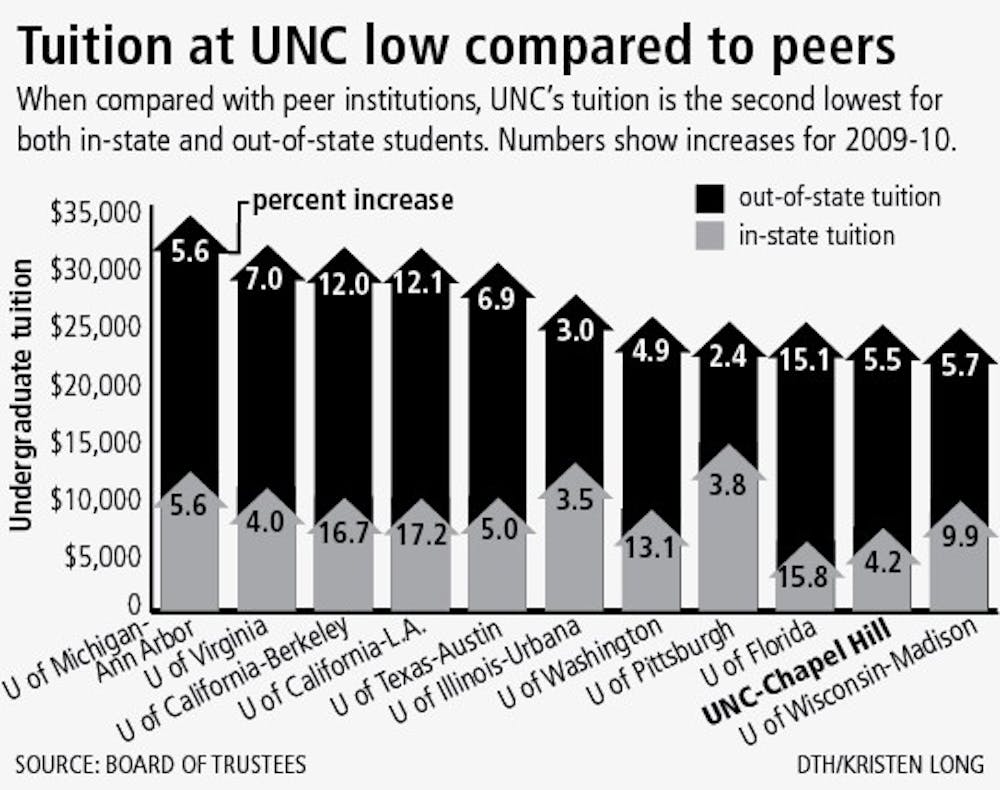On the same day the University of California system voted to increase undergraduate tuition by an unprecedented 32 percent, UNC administrators voted for a tuition proposal that demonstrated their resistance to high tuition.
The UNC Board of Trustees voted unanimously Thursday morning for a 5.2 percent tuition increase for all undergraduate students, bringing to a close campus discussions over the proposed hike.
If approved by UNC-system President Erskine Bowles, the system’s Board of Governors and the state legislature, the proposal would increase resident tuition by $200. For nonresident students, undergraduate tuition would increase by $1,127, and graduate tuition would go up $732.
But many trustees voiced concerns about the impact of the University’s low tuition rates compared to other schools on the quality of education the school can provide in the future, especially in the face of uncertain state revenues.
“I am really, really concerned about what we’re doing with tuition,” said John Ellison, who has served as a trustee since 2003. “There is a huge disparity between our tuition and that of our peers. It’s getting wider and wider.”
Senior Rakhee Devasthali, who was one of several students who protested a committee meeting Wednesday, also addressed the trustees, chastising them for a tuition process that she said lacked transparency and student input.
“You better come up with some better numbers,” she said. “This is not fair or democratic. You’re running these things like it’s a corporation, not like a University.”
UNC’s tuition remains low compared to those of its public academic peers.
In the 2009-10 year, the group of public institutions that UNC considers its academic peers raised resident undergraduate tuition by an average of 9.4 percent, as compared to UNC’s increase of 4.2 percent. And this year, many of those universities are set to raise tuition even more.
Many states have been driven to do so by significant budget shortfalls. This year, the California legislature slashed $637 million from its 10-school system.
The state of North Carolina and UNC have not faced similar problems, still receiving a significant share of its revenue from the state. This allows schools to rely less on tuition.
Whether that support can continue if the economy doesn’t improve is still a question trustees mentioned Thursday.
Trustee and Chancellor of the Massachusetts Institute of Technology Phillip Clay said he is worried about planning for a long-term financial crisis.
“We don’t know what the future will be, but I think that we are dealing with a budget situation that is not short-term,” he said.
Ellison said members would have to seriously reconsider low tuition rates in the future.
“I understand it’s a difficult year, but I am telling you all that this University is not going to maintain its academic standing in the world if we continue down the path we keep going down,” he said.
Tuition increases help pay for financial aid, faculty retention and academic services. This year’s increase will bring in about $4 million. UNC’s total revenue is about $2.3 billion.
Thorp said he thinks the trustees are justified in their concern about the UNC’s long-term success under a low-tuition model, but doesn’t know how to go about discussing this issue, especially in an economic downturn.
“We’re just happy that everything passed,” Thorp said. “The student body president and the trustees and the administration all wanted the same thing, and that doesn’t happen too often.”
Contact the University Editor at udesk@unc.edu.
Tuition leaves UNC’s hands
Trustees approve 5.2 percent hikes

Tuition at UNC low compared to peers



